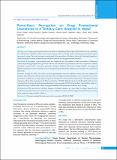Please use this identifier to cite or link to this item:
https://hdl.handle.net/20.500.14356/1029| Title: | Prescribers Perception on Drug Promotional Literatures in A Tertiary Care Hospital in Nepal |
| Authors: | Prasad, Pravin Mudvari, Anish Ghimire, Rakesh Karki, Naresh Yadav, Dipendra Shah, Shruti Gyanwali, Pradip |
| Citation: | PrasadP., MudvariA., GhimireR., KarkiN., YadavD., ShahS., & GyanwaliP. (2021). Prescribers Perception on Drug Promotional Literatures in A Tertiary Care Hospital in Nepal. Journal of Nepal Health Research Council, 19(1), 19-25. https://doi.org/10.33314/jnhrc.v19i1.3417 |
| Issue Date: | 2021 |
| Publisher: | Nepal Health Research Council |
| Article Type: | Original Article |
| Keywords: | Drug promotional literatures Prescriber perception WHO-ECMDP |
| Series/Report no.: | Jan-March, 2021; |
| Abstract: | Abstract Background: Drug promotional literatures can often be misleading and have biased information and can contribute to irrational use of medicines. Thus, it is necessary that prescribers critically analyze the drug promotional literatures presented to them. This study attempts to understand if the prescribers at Tribhuvan University Teaching Hospital are aware about the necessary information that should be present in a drug promotional literature. Methods: A descriptive cross-sectional study was conducted over six months in which prescribers at Tribhuvan University Teaching Hospital were provided with the self-administered questionnaire and were requested to submit the filled in questionnaire. Prescribers presently working at Tribhuvan University Teaching Hospital, attending out patient department services and had received drug promotional literatures within last six months were included in this study. Results: During the study, 163 of the received questionnaires met the inclusion criteria and were utilized for analysis. Advertisement, reminder items and others type of drug promotional literatures were commonly received by prescribers included in our study. Higher proportion of faculties (35.29%) preferred reprint type of drug promotional literatures. Most of the participants (47.85%) searched for 5-8 WHO-Ethical Criteria for Medicinal Drug Promotion criteria when referring a drug promotional literature. It was seen that 42.94% of prescribers realised that at least two out of four types of information related to negative attribute of the promoted medicines were missing. Conclusions: The prescribers with least duration of clinical exposure are more likely to always prescribe the medicines promoted to them. Prescribers were more confident on claims made in drug promotional literatures if they were supported using scientific evidences. Keywords: Drug promotional literatures; prescriber perception;WHO-ECMDP |
| Description: | Original Article |
| URI: | http://103.69.126.140:8080/handle/20.500.14356/1029 |
| ISSN: | Print ISSN: 1727-5482; Online ISSN: 1999-6217 |
| Appears in Collections: | Vol. 19 No. 1 (2021): Vol. 19 No. 1 Issue 50 Jan-Mar 2021 |
Files in This Item:
| File | Description | Size | Format | |
|---|---|---|---|---|
| 3417-Manuscript-21541-1-10-20210425.pdf | Fulltext Article. | 225.49 kB | Adobe PDF |  View/Open |
Items in DSpace are protected by copyright, with all rights reserved, unless otherwise indicated.
